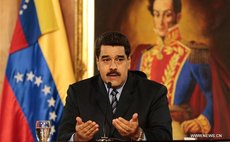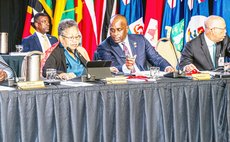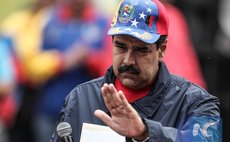Scotland's Independence: Should the Commonwealth Caribbean care?
On September 18, the electorate in Scotland will vote in a referendum to decide if Scotland should be independent of the United Kingdom (UK). A vote for independence will have far-reaching implications for both Scotland and what remains of the UK – England, Wales and Northern Ireland.
BBC Radio Scotland interviewed me this week in a search of the independence experience of countries, such as those in the Caribbean, that were once tied to Britain. My responses are contained in part in this commentary.
Of course, the essential difference between Caribbean countries and Scotland in their relationship to Britain is that the former were 'colonies' that wanted freedom from an imperial power that included Scotland; Scotland's participation in the UK was a voluntary act of union.
There are also no similarities between Scotland and Commonwealth Caribbean countries in terms of population size (Scotland's population is 5.2 million, more than twice the size of Jamaica, the largest former British Caribbean colony). With regard to per capita income, Scotland ranks much higher than former British Caribbean colonies at about US$39,642 with a share of North Sea oil (the highest per capita incomes in the Caribbean are The Bahamas (US$21,280 and Trinidad and Tobago US$14.400). Scotland's resources are also greater than any of the former British Caribbean colonies. It has a significant portion of the oil resources in the North Sea as well as a wide range of manufactured goods, including its famous whiskeys, and a vibrant services industry.
On the face of it, if the 12 former British Caribbean colonies can each survive as independent states, then Scotland should be able to do so as well. But, in truth, each of the former British Caribbean colonies has survived on the margins of the international community, and has remained reliant on aid, grants, technical assistance and dying preferential trade arrangements to one extent or another. They have also managed to provide some goods and services to their peoples through functional co-operation in areas that many of them could not finance alone. In today's global economic reality of tough terms of trade, limited access to development financing, tiny concessions to small economies by international financial institutions and rising costs to counter global threats such as Climate Change, drug trafficking and pandemics like HIV/Aids, Caribbean countries are finding it difficult to cope. Their participation as independent states in the international community, through membership of, and participation in, international and regional bodies, is also a huge financial burden as are the demands for regulation, supervision and enforcement of their financial services and other sectors. When in 1962, Jamaica voted in a referendum to leave the West Indies Federation (of ten countries), nobody won; everybody lost.
Arguably, Scotland, independent of the UK, would be better able to manage the demands of independence than all of the former British Caribbean colonies. But the challenges will be many and the costs high, outweighing the benefits of going it alone. Even at the point of a split with the UK, Scotland would be confronted with huge issues; among them: acceptance of a part of the UK national debt (now around US$1,902 million). Estimates put the portion of the debt that Scotland would have to assume at about 123% of its GDP. This would have a deleterious effect on Scotland's ability to raise money on the international market except on very onerous terms. There would also be maritime limitation issues with the United Kingdom that would reduce the share of benefits from North Sea oil. In any event, oil revenue is not assured. Tax revenue is dependent on the price of oil which is set in world markets.
On top of all this is the current raging issue of an independent Scotland's currency. The leader of the Scottish National Party, Alex Salmond, who is heading the independence movement, says that Scotland would retain the British pound. This is a highly problematic proposition since the value of the currency, and policies affecting it, would not be based on factors within Scotland but on the performance and interests of the rump UK - England, Wales and Northern Ireland.
The alternative of a separate currency for Scotland has been debated but not proposed as an option in the current debate on Scotland's independence. However, if Scotland were to establish its own currency – the threats to its economy would be daunting. There is no international market for Scottish pounds, and Scotland has no credit history. A Scottish currency would depreciate once it was no longer intertwined with the British pound, creating an inflation risk. Some currency analysts have suggested tying the currency to oil, but even they have admitted that doing so would introduce volatility to the currency's value and leave the Scottish economy seriously exposed to oil price shocks.
Beyond all of this, Scotland – like Caribbean countries – would find itself without a voice in the G7 and the G20, the two all-powerful bodies (of which the UK is a part) that now make international economic decisions. Similarly, it would also have no voice on the Executive Board of the International Monetary Fund and the World Bank where the UK now wields influence. While it would surely be admitted to organisations such as the UN and the Commonwealth, it would have no place on the UN Security Council where the UK now sits as a permanent member.
Further, Scotland would have to establish machinery for foreign affairs, defence and security, including joining every international organisation of note and setting up diplomatic missions to all of them and to the many countries with which it should have relations in its economic and political interest.
Incidentally, while Scotland will be a medium-sized state operating on the margins of the big countries, the UK will also be diminished. The extraction of Scotland from the economy of Britain would significantly reduce the UK's ranking in the world's largest economies from 6th where it currently stands to 10th – falling behind Brazil, Italy, Russia and India. This would call into question Britain's pre-eminent position in the UN Security Council, the IMF and World Bank, and even organisations such as the Commonwealth and the Organisation of Economic Co-operation and Development. It also means that the rump UK would have to continue to pay the high costs of its own participation in the international community, including defence and security, from a smaller pot of revenues.
It is difficult to see how Scotland or the remaining Union of England, Wales and Northern Ireland would benefit from Scotland's independence, particularly as their weakened circumstances as individual states would be exploited by other nations.
There would also be no benefit in the balkanisation of the UK for countries in the Caribbean who have relied on an influential Britain to advocate their causes in the European Union. The Caribbean should care if Scotland votes for independence.
(The writer is a Consultant, Senior Fellow at London University and former Caribbean diplomat)
Responses and previous commentaries: www.sirronaldsanders.com




